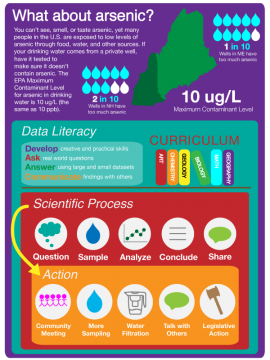Data to Action: A Secondary School-based Citizen Science Project to Address Arsenic Contamination of Well Water

http://www.allaboutarsenic.org/
Project Website(s)
-
Project Description
Arsenic contamination of well water, one of the most pressing public health issues in Maine and New Hampshire, provides an opportunity for students to engage in a real-world issue as citizen scientists and to translate data into action. Middle and high school teachers receive training in managing, interpreting, and communicating environmental health data in the context of a citizen science project. Project coordinators and scientist-partners support teachers and students as they implement well water monitoring projects in the classroom, analyze data, effectively communicate their data, and work to reduce arsenic exposure in their communities. The relationship between students, teachers, and scientist-partners creates a self-sustaining network that will provide continued mentoring and data literacy support for science teachers and students into the future.
-
Abstract
The ultimate goal of the “Data to Action” project is to create and pilot a national model of STEM education that engages students as citizen scientists and provides them with tools, skills and resources to make sense of data so that their results can inform actions at the local, regional, and even national level.
Engaging students in community-based projects that result in data that is relevant to their lives will stimulate interest in science and lead to the pursuit of further STEM education and interest in STEM careers. In Maine and New Hampshire, arsenic contamination of well water is one of the most pressing public health issues. Most people in these states derive their drinking water from private wells. Often these groundwater reserves are contaminated with arsenic, in many cases far exceeding the EPA limit of 10 ppb. Therefore, addressing this issue in Maine and New Hampshire secondary science classrooms provides context for students to engage in scientific inquiry, and motivation for them to construct knowledge and meaning through the process of discovery.
Students will collect well water data for arsenic analysis, and learn to analyze and communicate their findings, so as to effectively inform their communities and move people to action. Their data will inform the Maine Center for Disease Control and the New Hampshire Department of Environmental Services, which have both been working to improve well water testing rates for arsenic in order to understand the extent of the problem and protect public health. To accomplish this goal, we will provide teacher training in citizen science and environmental monitoring and build skills in data analysis and communication in a Summer Data Literacy (DataLit) Institute. Then, we will work with teachers to implement citizen science projects in their classrooms.
Local scientists recruited from Maine and New Hampshire IDeA Network of Biomedical Research Excellence (INBRE) partner institutions will form partnerships with teachers and students and help them with their projects, in particular, with understanding the results of well water monitoring and helping them translate their findings into local action. We plan to extend these Student-Teacher-Scientist Partnerships throughout both states, effectively creating “STEM Satellite Centers” in the vicinity of each INBRE institution. By establishing links between INBRE institutions and surrounding schools, long term relationships will ensue that will prove helpful to teachers and students beyond this particular citizen science project, inspiring generations of students to be critical thinkers and consider careers in science, medicine, or public health.
PUBLIC HEALTH RELEVANCE: Data to Action is focused on the issue of arsenic contamination of well water, one of the most pressing public health issues in Maine and New Hampshire. In the context of learning about groundwater, students will collect well water samples from their homes for analysis. Students and their teachers will partner with local scientists to analyze and understand their data in order to translate their findings into local action. Well water testing by students will contribute to state agency efforts to understand and mitigate arsenic exposure in local communities, while increasing student competency and interest in science.
-
Dissemination Strategies
- Case Studies
- Each teacher will complete a case study at the conclusion of their project providing inspiration around curricular activities, strategies for building school-community connections in stewardship of groundwater, and replicable project design. Case studies will live on the project website, All About Arsenic.
- Community Meetings
- Students, teachers, and scientist-partners will work together to plan a community meeting to inform their communities about the importance of testing well water. They will present their data and analyses, provide information about local resources, and explain why arsenic in drinking water is such an important issue.
- NIH IDeA Networks of Biomedical Research Excellence
- The Maine and New Hampshire INBRE programs websites will link to the “Data to Action” project website (www.allaboutarsenic.org) and include news items related to the project.
- Events
- Citizen Science Association Conference
- Northeast Regional INBRE Meeting
- National IDeA Symposium of Biomedical Research Excellence (NISBRE)
- Annual SEPA Conference
- NH Arsenic Consortium
- And more as they arise
- Case Studies
Project Photos
Project Audience
Middle and high school students and teachers
Subjects Addressed
Well water contamination, arsenic, data literacy, citizen science, STEM, translating data to action
Associated SEPA Publication(s)
-
Adaptations to a secondary school-based citizen science project to engage students in monitoring well water for arsenic during the COVID-19 pandemic. Journal of STEM Outreach, Special Issue – COVID – 19
Journal of STEM Outreach
Farrell, A., Buckman, K., Hall, S., Munoz, I., Bieluch, K., Zoellick, B., & Disney, J. -
Development of Privacy Features on Anecdata.org, a Free Citizen Science Platform for Collecting Datasets for Climate Change and Related Projects
Frontiers in Climate
Bailey C., Farrell A., Taylor A., Purty T., & Disney J., -
Defining Drinking Water Metal Contaminant Mixture Risk by Coupling Zebrafish Behavioral Analysis with Citizen Science.
Scientific Reports
Babich, R., Craig, E., Muscat, A., Disney, J., Farrell, A., Silka, L., & Jayasundara, N.












